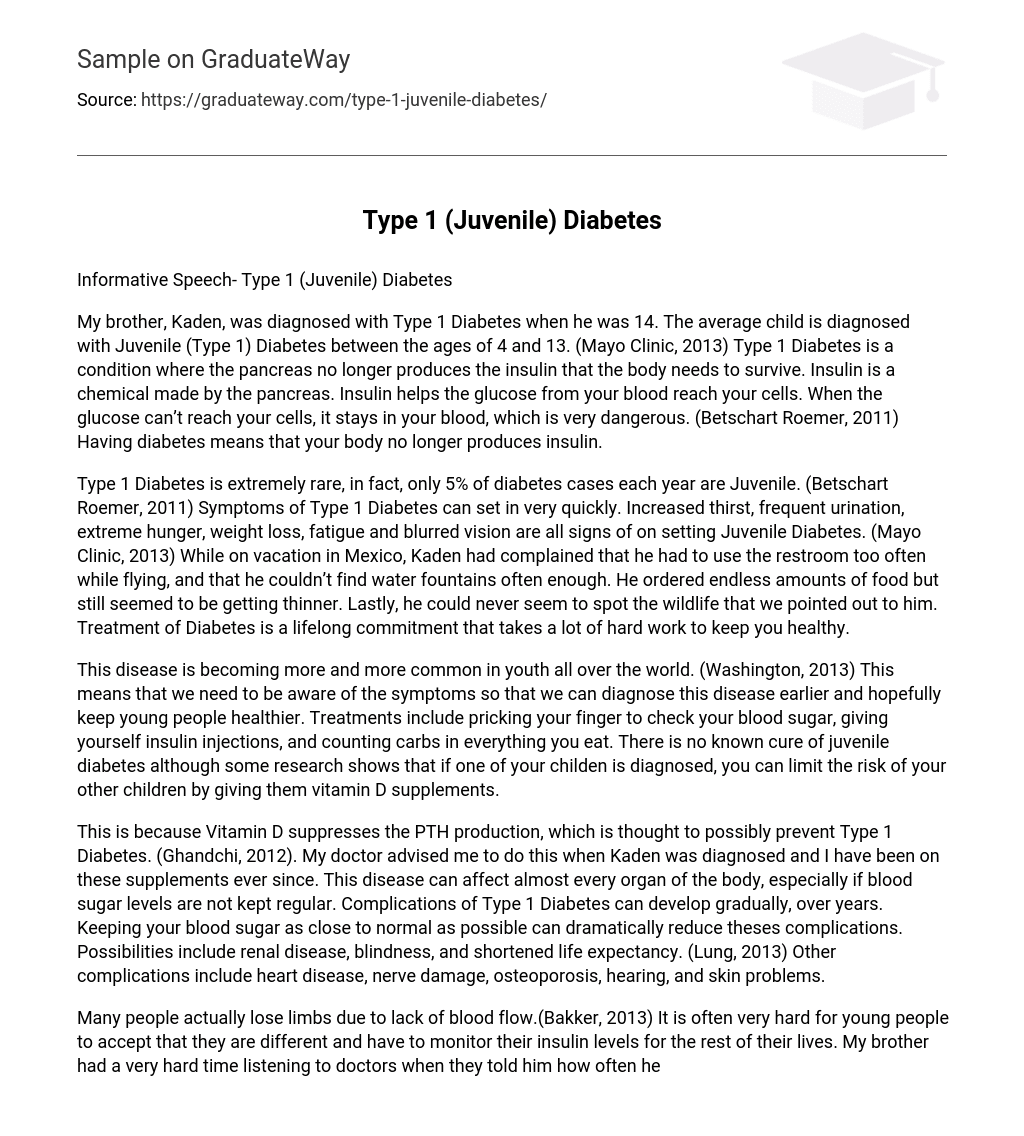Informative Speech- Type 1 (Juvenile) Diabetes
My brother, Kaden, was diagnosed with Type 1 Diabetes when he was 14. The average child is diagnosed with Juvenile (Type 1) Diabetes between the ages of 4 and 13. (Mayo Clinic, 2013) Type 1 Diabetes is a condition where the pancreas no longer produces the insulin that the body needs to survive. Insulin is a chemical made by the pancreas. Insulin helps the glucose from your blood reach your cells. When the glucose can’t reach your cells, it stays in your blood, which is very dangerous. (Betschart Roemer, 2011) Having diabetes means that your body no longer produces insulin.
Type 1 Diabetes is extremely rare, in fact, only 5% of diabetes cases each year are Juvenile. (Betschart Roemer, 2011) Symptoms of Type 1 Diabetes can set in very quickly. Increased thirst, frequent urination, extreme hunger, weight loss, fatigue and blurred vision are all signs of on setting Juvenile Diabetes. (Mayo Clinic, 2013) While on vacation in Mexico, Kaden had complained that he had to use the restroom too often while flying, and that he couldn’t find water fountains often enough. He ordered endless amounts of food but still seemed to be getting thinner. Lastly, he could never seem to spot the wildlife that we pointed out to him. Treatment of Diabetes is a lifelong commitment that takes a lot of hard work to keep you healthy.
This disease is becoming more and more common in youth all over the world. (Washington, 2013) This means that we need to be aware of the symptoms so that we can diagnose this disease earlier and hopefully keep young people healthier. Treatments include pricking your finger to check your blood sugar, giving yourself insulin injections, and counting carbs in everything you eat. There is no known cure of juvenile diabetes although some research shows that if one of your childen is diagnosed, you can limit the risk of your other children by giving them vitamin D supplements.
This is because Vitamin D suppresses the PTH production, which is thought to possibly prevent Type 1 Diabetes. (Ghandchi, 2012). My doctor advised me to do this when Kaden was diagnosed and I have been on these supplements ever since. This disease can affect almost every organ of the body, especially if blood sugar levels are not kept regular. Complications of Type 1 Diabetes can develop gradually, over years. Keeping your blood sugar as close to normal as possible can dramatically reduce theses complications. Possibilities include renal disease, blindness, and shortened life expectancy. (Lung, 2013) Other complications include heart disease, nerve damage, osteoporosis, hearing, and skin problems.
Many people actually lose limbs due to lack of blood flow.(Bakker, 2013) It is often very hard for young people to accept that they are different and have to monitor their insulin levels for the rest of their lives. My brother had a very hard time listening to doctors when they told him how often he had to prick his finger. He also had difficulty keeping his glucose levels from dropping too low. Sometimes during basketball games, he had to eat a Snickers during time-outs.
Kaden eats more than everyone else in my family, and still has trouble gaining weight. With all of the chemical fluctuations in his body, he will more than likely always be skinny. Type 1 Diabetes is a condition where the pancreas no longer produces the insulin that the body needs to survive, there are no prevention methods, but many ways you can treat it to live a healthy life. This disease can blindside you and your family with complications, but the best thing you can do is always support your loved one who was diagnosed.





